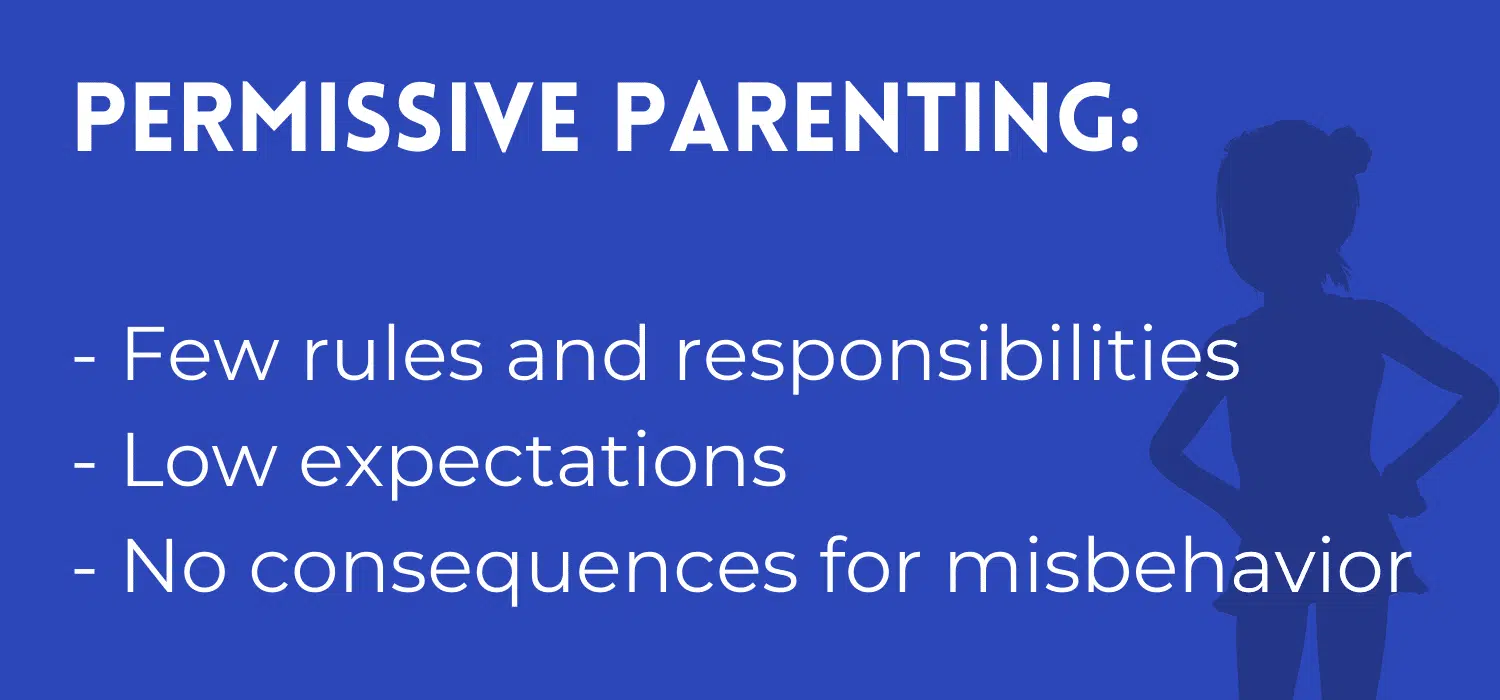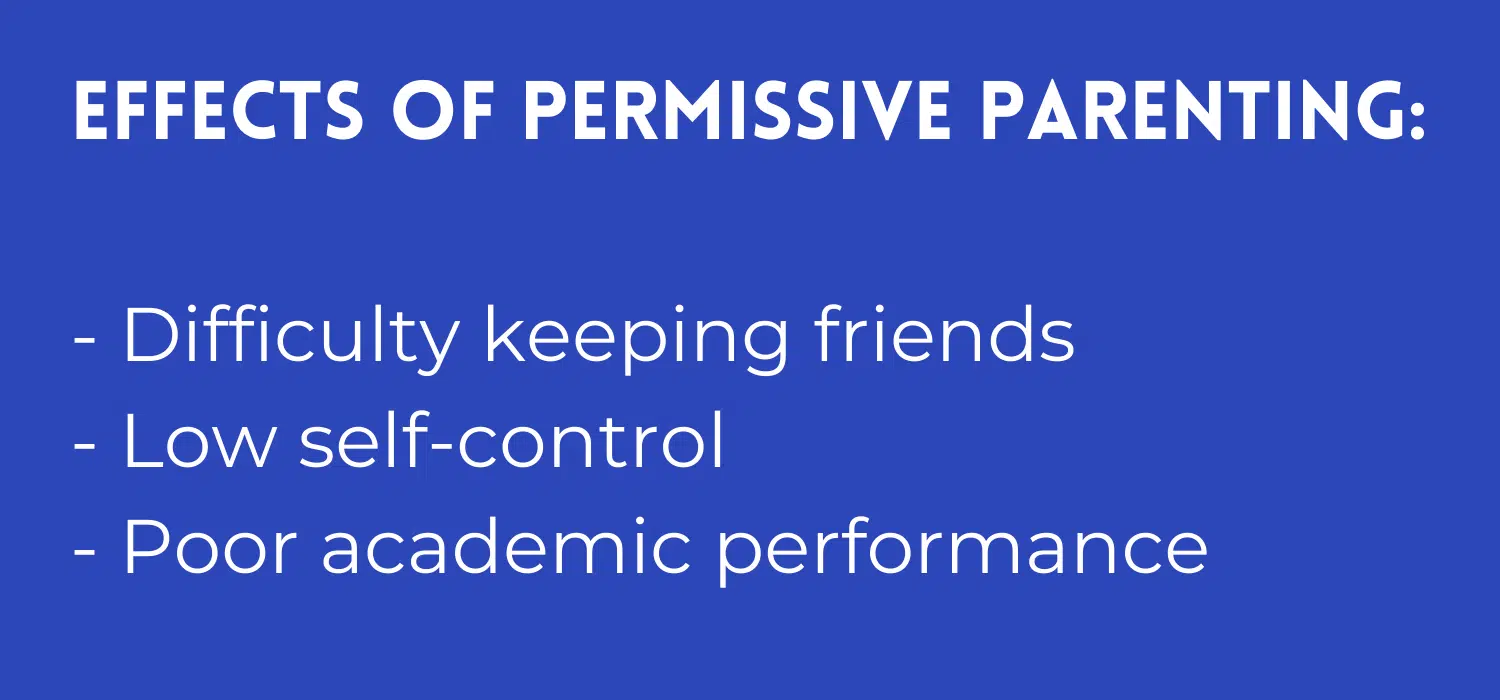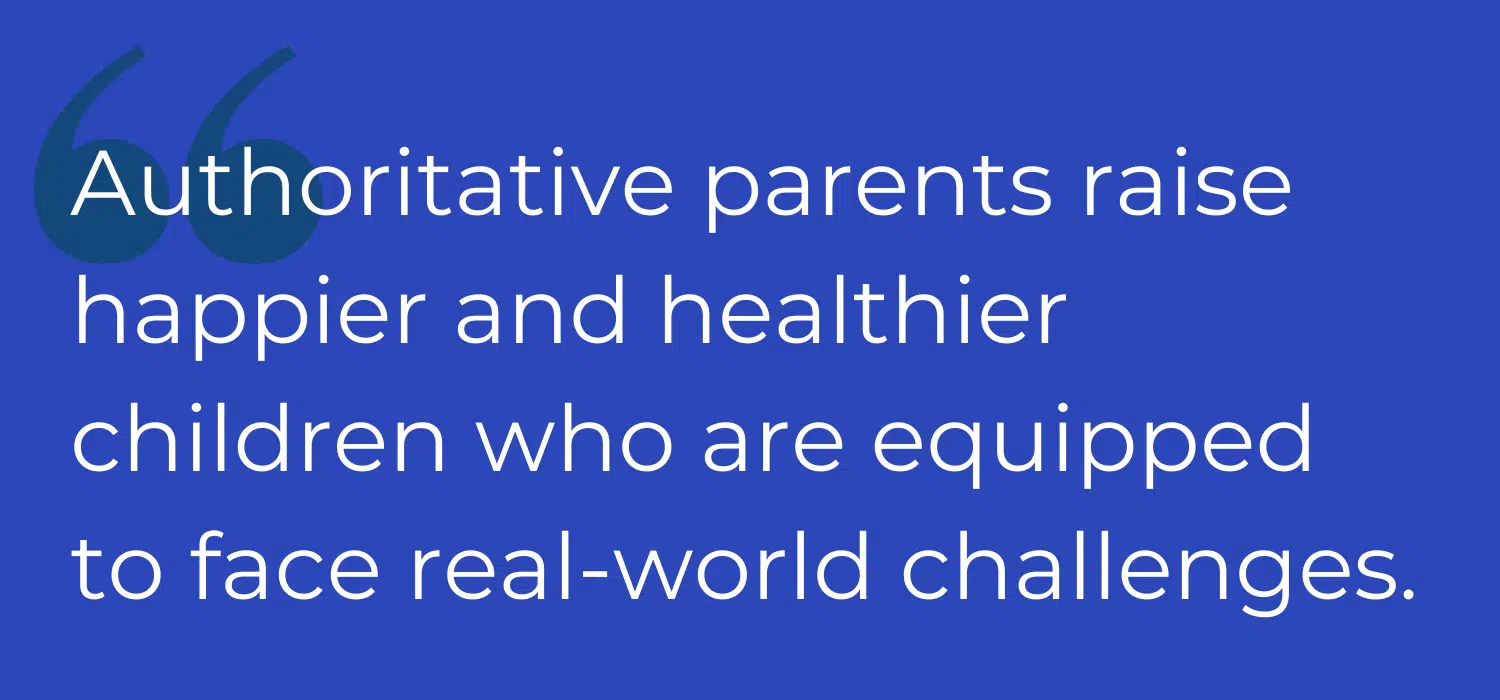They say that children don’t come with a handbook. And that’s true. But if they did, it would hold amazing insight from a woman named Diana Baumrind. Baumrind was a developmental psychologist at the University of California at Berkeley in the 1960s.
After studying the behavior of preschool children, she found that there is a close relationship between children’s behavior and the style of parenting used by their parents. These different styles lead to different outcomes, behaviors, and manners of adjustment in the children as they grow.
Baumrind’s 3 Parenting Styles
Baumrind defined three parenting styles: authoritative, authoritarian, and permissive (also called indulgent).
- Permissive parents refuse to or cannot set limits. If they do attempt to do so, they are inconsistent.
- Authoritarian parents demand to be in charge. There’s no discussion and no teaching. They simply want the child’s obedience.
- Authoritative parents have high expectations for both maturity and achievement. Yet they are kind and open in their interactions. They set rules and boundaries. They talk with their children and provide guidance. And they teach their kids to use reason. These children are well-adjusted and happy. For these and many other reasons, authoritative is the preferred parenting style.
This article will focus on the characteristics and detrimental effects of permissive parenting. If you see these traits in you or your children, do not worry. All is not lost! We will offer some ways you can change your parenting style and become more authoritative. When you do, you will see an amazing transformation in your child and in your relationship with him.
So, let’s look at what a permissive parenting style entails.
The Permissive Parenting Style
Permissive parents seem to want to be friends with their children. They even allow their children to make decisions beyond their capabilities, and they offer little guidance in such decisions. The characteristics of this parenting style include the following:
- Permissive parents are afraid or unwilling to exert control over their children. While they are loving in their interactions, they set few boundaries. If there are rules, these parents do not consistently enforce them. The word “no” is rarely in their vocabulary. As a result, their kids have too much freedom and too little responsibility.
- Permissive parents may also use toys or food as bribes to make their children behave. These prevent the child from understanding the true reasons why he should follow rules.
- In addition, permissive parents often fail to set goals. Nor do they stress the importance of goal setting. This lack results in children having difficulty in school and in life more generally.
- Rarely do permissive parents enforce consequences for misbehavior. Some may even laugh off bad behavior or dismiss it as just a normal part of childhood.
All of these traits lead to a poorly-adjusted child who grows into a poorly-adjusted adult.
Effects of Permissive Parenting
Because children of permissive parents have not been encouraged to follow rules or respect authority, the effects on the children are often extremely harmful. For example:
- These children have difficulty following rules.
- They have problems with self-control.
- They tend to think that the world revolves around them, and they therefore don’t consider how others feel. They have difficulty keeping friends, especially as many struggle to develop empathy or share with others.
- Children of permissive parents often do not perform well in school. Because the parent does not teach good study habits or responsibility for homework or schoolwork, the children lack the self-discipline it takes to earn good grades or to turn in assignments on time.
- Further, because permissive parents set few limits, their children lack impulse control and tend to be more aggressive than their peers. They often don’t understand that the world has limits and isn’t like their home environment, where they can do whatever they want. This low impulse control leads to a higher incidence of drug and alcohol problems.
- In addition, studies have shown that children of permissive parents are more likely to get into trouble with the law.
One of the most important things for kids to learn is how to regulate their own emotions and behaviors. But a permissive parenting style does not teach this, so the child enters the world with unrealistic expectations about how he can behave.
And because of the lack of structure and limits within the home, these children often spend too much time watching TV, playing video games, and surfing the Internet.
If a child is spending hours each day doing what he wants on his computer or phone, chances are he’s exploring sites he shouldn’t. He’s reading articles that are too mature for him. He’s seeing things his young eyes shouldn’t see. In short, he’s becoming educated by a secular world that teaches there are no boundaries and that people should do whatever makes them feel good.
Permissive Parenting Also Affects the Soul
According to Verywell Mind:
In one study, permissive parenting was linked to underage alcohol use; teens with permissive parents were three times more likely to engage in heavy drinking. Researchers also suggest that permissive parenting is linked to other risky behaviors such as drug use and other forms of misconduct.
“Other forms of misconduct” include risky sexual behaviors. When a child cannot regulate his behavior, he often goes to extremes to get what he wants. This is especially true when it comes to sexual impulses.
If a child has been brought up with little regard for rules in general, he will likely not want to follow God’s or the Church’s rules. He will see these rules as pointless, too restrictive, or arbitrary.
Our world is moving further and further away from God’s laws, replacing them with ideals that teach we should do what we want, when we want, as long as no one gets hurt. This is the “you do you” mentality. For many people, sexuality falls into this category.
But kids—and many adults as well—fail to understand that a promiscuous lifestyle does hurt someone; it hurts them. Porn, contraception, and premarital sex are just a few of the harmful behaviors that have been normalized by our society. If left without lessons about boundaries and morality, kids will hear only what the world tells them. And the world tells them that these things are okay.
Kids will not learn that porn addiction is real and that porn can create unrealistic expectations about the human body and relationships. They will not learn that objectifying people is wrong. They will not learn that the human body is a gift that should be reserved for a loving spouse.
They will not learn the evils and dangers of contraception. They will only see it as a means to sexual gratification without consequences. They will learn that abortion is a viable option when contraception fails. And they will not consider the life of the preborn baby who is created, as they will only think of how a pregnancy affects their own lives.
Growing up without rules and boundaries, these children will balk at the rules of morality.
Become an Authoritative Parent
If parents do not teach children that life has limits, and if they fail to set boundaries, their children will have great difficulty adjusting to the world as they grow and become adults. They will have trouble with bosses who want to give direction. And they will have difficulty in relationships. A permissive parenting style affects much more than we can ever imagine.
So, if you notice that you are trying to be your child’s friend, or that you have trouble setting limits, know that you can change your style. There are ways to break this cycle.
Children need guidance. They need limits. In fact, they crave these things. Even though they may never admit it, children feel more secure with them. When you set limits and hold your children accountable for their behaviors, you help them see the value of discipline. You help them grow both spiritually and emotionally. You help them become better adjusted to a world filled with many different kinds of people.
So, what can you do to reverse the problems of a permissive parenting style?
First and foremost, sit down with your children and talk to them about rules and expectations. Explain that you have their best interests in mind and that these rules are to help them. Talk about any consequences of not following the rules. The consequences should be logical and natural. For instance, if a child spends too much time watching TV, TV time will be limited. If a child does not finish homework, you will take away his phone/computer/TV. If an older teen comes home late, you will take the car keys.
The point is to help children see that their actions have logical consequences and to teach them to make adjustments in their actions.
And then you must follow through. It’s easy to want to be on the “good side” of your child or to avoid confrontation. But effective parenting requires that you set expectations and then follow through with consequences. Holding a child accountable for his actions now will help him in the future.
Spend time talking with your child and really listen to what he has to say. Ask about school and his friends. If he is old enough, ask his opinion on things going on in the world. Let your child express his emotions, and then validate those emotions.
Make sure your child knows that you understand and think about his feelings on different matters. As parents, we can’t—and shouldn’t—give our kids everything they want, but we can certainly listen to their opinions and make decisions based on what’s best for the family. You may not be able to enlist your child’s opinion on whether you should take a job in a different state and uproot his life, but you can ask how he feels and listen to his concerns. Then work together to find a solution. This will show your child that you value his feelings and that he is important to you.
An authoritative parent will also balance freedom with responsibility. The more responsibility a child exhibits, the more freedom he gets as he grows.
Overprotectiveness
With the predominance of school shootings, violence in our streets, increased hatred, and other vicious acts, some parents may become too overprotective. While it’s vital that we watch out for our children to keep them safe, we must also realize that there are dangers in overprotectiveness as well.
What are some of the behaviors of an overprotective parent? They will comfort a child too quickly after a minor fall or scrape. They impose strict rules that prevent the child from having fun and getting dirty outside, being creative, or doing other normal “kid” activities. Their punishments are too harsh and are not natural consequences for the behavior.
This type of parenting will lead to a child feeling that he must lie so he doesn’t get into trouble. The child will also pick up on cues from his parent, so if the parent is scared about the outside world, the child is likely to be scared, as well. In addition, the child of a parent who never allows him to do “normal, health risk-taking” often grows up to “take risks that come with a much higher price.”
Overprotective parents may also lack communication skills with their children, as they have never opened up those lines of communication and respect.
A Michigan State University article also warns that kids who “experience a reward/punishment system for their behavior…can grow up to be adults who are materialistic and manipulative. They don’t do the right thing just because it is the right thing to do.”
This is exceptionally disturbing, as teaching right and wrong is vital.
Final Thoughts
Parenting is an incredibly difficult, yet an extremely rewarding job. In fact, there really is nothing more important in the world than raising a child. So, if you have been overly permissive, know that you now have the knowledge and the ability to make changes. Sit down with your child and speak openly. Explain how much you love him and how you are both going to change your behaviors so that he can grow up to be a much better adjusted child.
And if your spouse has yet to get on board or doesn’t quite understand the detrimental effects of permissive parenting, keep talking. But speak in love. Show him or her the research. Give evidence of how this type of parenting is harming your child and how your child can thrive when you change your family dynamics. It may take time, and in some cases you may need to enlist outside help, but persistence and consistency are key.
Finally, let us remember this: “Researchers who examine parenting styles have consistently found that authoritative parents raise happier and healthier children who are equipped to face real-world challenges.”
Our world today has more challenges than we can count. Setting our children up for success is one of the most important things we can do—psychologically, spiritually, and physically.
Authoritative parenting requires effort, love, discipline, patience, and kindness—the very qualities God our Father exhibits. Let us pray that we can follow His lead as we lead our children to Him.
This article was originally published in November 2021 and was most recently updated in January 2024 by Susan Ciancio.
Related Content
Susan Ciancio has a BA in psychology and a BA in sociology from the University of Notre Dame, with an MA in liberal studies from Indiana University. Since 2003, she has worked as a professional editor and writer, editing both fiction and nonfiction books, magazine articles, blogs, educational lessons, professional materials, and website content. Fourteen of those years have been in the pro-life sector. Currently Susan writes weekly for HLI, edits for American Life League, and is the editor of its Celebrate Life Magazine. She also serves as executive editor for the Culture of Life Studies Program, an educational nonprofit program for k-12 students.






















You are right. Today, in a public place, we see parents still carrying their 6 year olds around as if they’re 2 year olds. Letting your 6 year child hop on benches with his dirty shoes where others will have to sit later … your 6 year old has been taught so little self control that he can’t sit still for 10 minutes and has to hop around like a kangaroo on benches with his dirty shoes in a public place … .
This article is spot on. We are pregnant with our fifth child, and this is what we do. I wish more people would. We need stronger parents today.